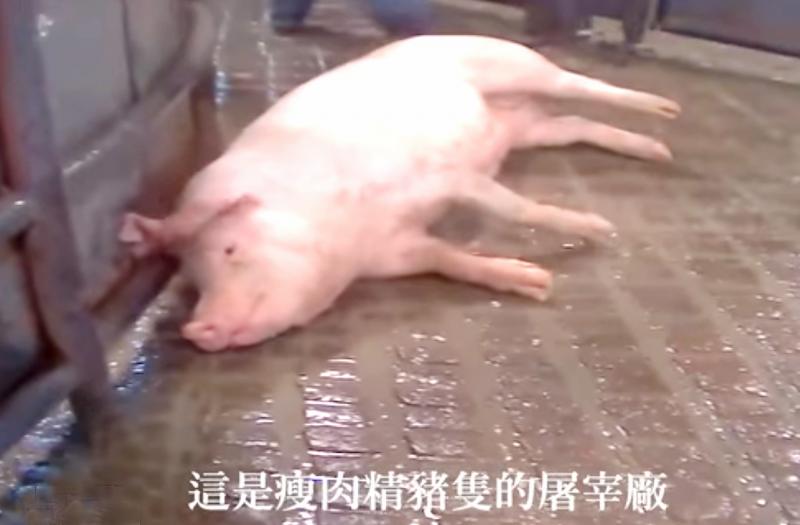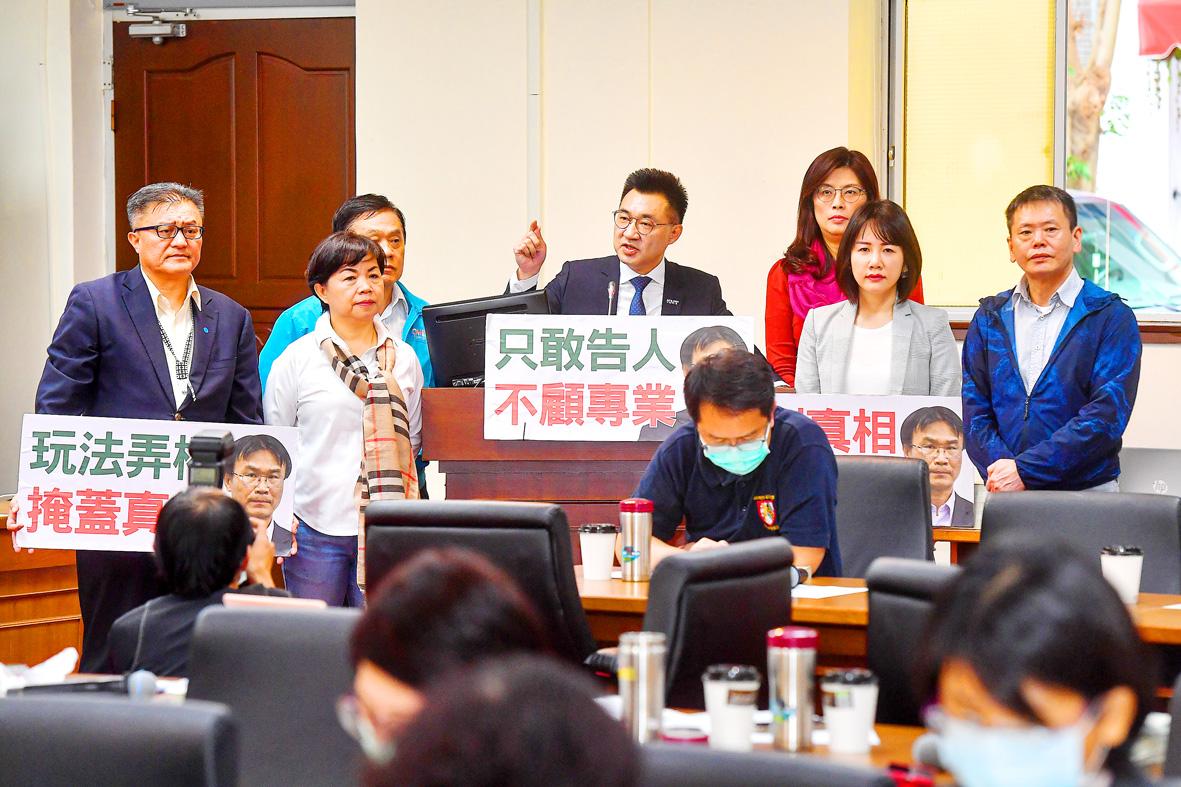The Council of Agriculture (COA) yesterday urged the Chinese Nationalist Party (KMT) to remove a video it posted on Facebook on Tuesday, saying that it might be spreading false information by claiming that pigs given ractopamine experience physical and emotional pain.
The KMT is using the video, which shows pigs shivering and in apparent pain, as part of its attacks on the government’s decision to lift an import ban on pork containing the leanness-enhancing drug, COA Minister Chen Chi-chung (陳吉仲) said ahead of a budget review at the Legislative Yuan in Taipei.
The video was made by the US-based Animal Outlook group and released by the organization to protest inhumane killings of hogs at slaughterhouses, Chen said, adding that ractopamine was not mentioned in the original video.

Photo: Screen grab from Facebook
The KMT added Chinese narration that is inconsistent with the images, making the video “100 percent falsified and 100 percent inaccurate,” he said.
The KMT’s video said that “it is a slaughterhouse of pigs fed with the leanness-enhancing drug,” “ractopamine incites mood swings in pigs” and “pigs fed with the additive would get sick, let alone humans.”
The video allegedly constitutes spreading misinformation and generating a sense of public fear as the KMT attempts to mislead people by linking the drug to hog abuse, Chen said.

Photo: CNA
If the KMT does not remove the video, the council would file a lawsuit under the Social Order Maintenance Act (社會秩序維護法), Chen said, urging people not to repost or share it.
KMT Chairman Johnny Chiang (江啟臣) said that the party would not remove the video, as the information in it has been verified.
Not only has the government refused to address the health concerns surrounding pork containing traces of ractopamine, it is also seeking to deny freedom of speech, Chiang said.
A government that damages people’s health is in no position to punish a group defending health for others, he said.

Taiwanese actress Barbie Hsu (徐熙媛) has died of pneumonia at the age of 48 while on a trip to Japan, where she contracted influenza during the Lunar New Year holiday, her sister confirmed today through an agent. "Our whole family came to Japan for a trip, and my dearest and most kindhearted sister Barbie Hsu died of influenza-induced pneumonia and unfortunately left us," Hsu's sister and talk show hostess Dee Hsu (徐熙娣) said. "I was grateful to be her sister in this life and that we got to care for and spend time with each other. I will always be grateful to

REMINDER: Of the 6.78 million doses of flu vaccine Taiwan purchased for this flu season, about 200,000 are still available, an official said, following Big S’ death As news broke of the death of Taiwanese actress and singer Barbie Hsu (徐熙媛), also known as Big S (大S), from severe flu complications, the Centers for Disease Control (CDC) and doctors yesterday urged people at high risk to get vaccinated and be alert to signs of severe illness. Hsu’s family yesterday confirmed that the actress died on a family holiday in Japan due to pneumonia during the Lunar New Year holiday. CDC Deputy Director-General Tseng Shu-hui (曾淑慧) told an impromptu news conference that hospital visits for flu-like illnesses from Jan. 19 to Jan. 25 reached 162,352 — the highest

TAIWAN DEFENSE: The initiative would involve integrating various systems in a fast-paced manner through the use of common software to obstruct a Chinese invasion The first tranche of the US Navy’s “Replicator” initiative aimed at obstructing a Chinese invasion of Taiwan would be ready by August, a US Naval Institute (USNI) News report on Tuesday said. The initiative is part of a larger defense strategy for Taiwan, and would involve launching thousands of uncrewed submarines, surface vessels and aerial vehicles around Taiwan to buy the nation and its partners time to assemble a response. The plan was first made public by the Washington Post in June last year, when it cited comments by US Indo-Pacific Commander Admiral Samuel Paparo on the sidelines of the Shangri-La Dialogue

Suspected Chinese spies posing as Taiwanese tourists have been arrested for allegedly taking photographs of Philippine Coast Guard ships, local media reported. The suspected spies stayed at a resort in Palawan, where from a secluded location they used their phones to record coast guard ships entering and leaving a base, Philippine TV network GMA said on Wednesday. Palawan is near the Spratly Islands (Nansha Islands, 南沙群島) and other disputed areas of the South China Sea, where tensions have been on the rise between China and the Philippines. The suspects allegedly also used drones without permission and installed cameras on coconut trees in the